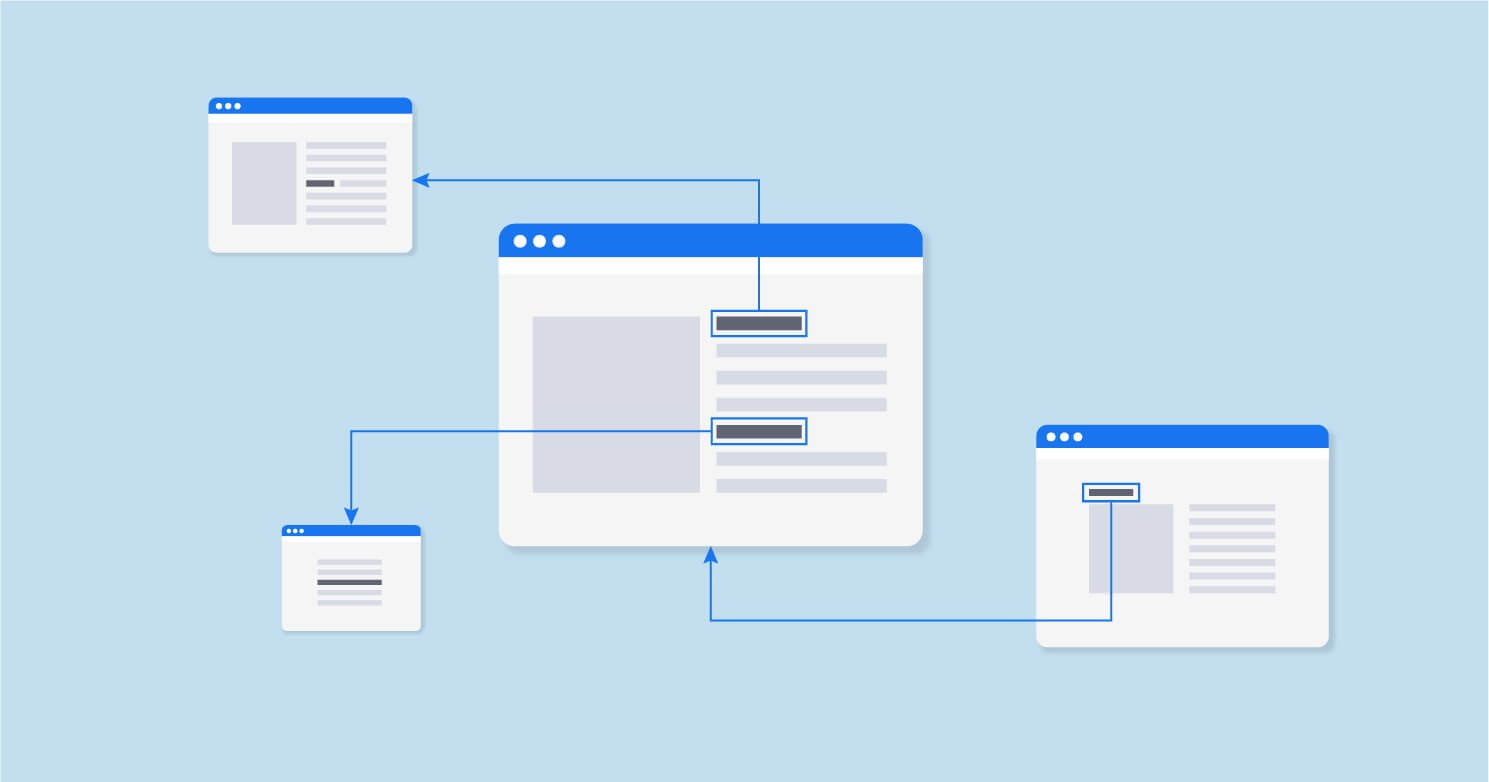Creating links to other sites on your blog can be difficult, but it is important to your strategy. Understand everything on this topic!
When applying a content marketing strategy, generally, we are faced with a question: should I include links that direct the user to other pages?
It is good that you know that you are not the only one. It’s a controversial topic, which has been debated among professionals in the digital marketing community a long time ago.
At the end of the day, during the execution of your inboud marketing actions , creating relevant articles requires a great effort from the team. So what is the advantage of sending a valuable visitor to another website?
Believe me, there are benefits to external links embedded in your corporate blog. And, in this article, you will know why you should start using them right now!
What are external links?
Table of Contents
The first thing you need to know is that, in the contemporary digital marketing scenario, there are two common definitions for external links, but they have different functions and origins. It is just a matter of terminology.
To facilitate understanding of the concept, you should keep in mind that we are talking as a company, that is, from the internal point of view. Or, if you prefer, as an entrepreneur.
The input links
The first designation is the most common. Inbound links (or inbound links) are links on external pages that direct the user to your own website.
In other words, external and uncontrollable localities, whose domains are not under the care of the entrepreneur.
They can be found on competitor blogs, news portals, social networks, etc. As its name says, it is the way a visitor has to enter your website.
Without a doubt, they bring great benefits to an SEO strategy.
When a page refers to one of your content, part of its authority passes to it. In other words, you are telling GoogleBot that this text is relevant and reliable.
Therefore, the algorithm considers this action as an excellent indicator for positioning. We conclude, therefore, that the more pages you create links for your website, the better.
The authority factor
But things are not that simple like that.
Imagine that, in a classroom, the teacher asks the following question: What is the best company in the world?
A subjective question, as well as many of those that are searched in the search mechanisms on a daily basis.
The students in question are all university students and have different answers to the question. “It’s Samsung,” says one of them. Another yells from the bottom: “It can only be Amazon.” A third says: “It sure is Apple”, and is supported by two other students. If it was a Million Show question, you’d probably agree with most, wouldn’t you?
Now there is a sixth student in the classroom. It is a highly qualified professional, with years of experience in the international market and post graduation abroad. Calmly he says: “They are all wrong. The best company in the world is Google ”.
Now tell me: which of those students has more authority to comment on the matter?
At Google, things work in a similar way. A page with more authority will, of course, have more leverage.
In Searching Engine Optimization matters , this is called Page Authority or Domain Authority.
Therefore, it is much more important to have a link directing the user to your blog on www.administradores.com.br than on several small blogs without much relevance.
Did you understand now? Very well. Then you already know that inbound links are essential for the success of an SEO strategy.
Let’s talk now about another type of external link, which is the one that generates most of the questions in the digital environment.
The exit links
Now imagine the opposite position. Your page has a good quality index.
Theoretically it would be a waste of time to send users to other blogs, don’t you think?
Ultimately, that would increase your rejection rate, end customer contact with your brand, and worst of all, could strengthen the competition.
Is that really so?
The outbound links are those that you use on your own blog, sending the user to another page.
It is a controversial issue. At the end of the day, many entrepreneurs look down on this practice. Some of the most common questions are:
- Is that action going to harm the reputation of my brand?
- In this way I will not be benefiting the pages of the competition?
- Will this action not increase my exit rate?
- Why send traffic to pages that are not mine?
In truth, all of these questions are quite pertinent. However, below, you will discover how using exit links can be an excellent resource for your SEO strategy.
The SEO objective
The concerns cited in the previous topic afflict various entrepreneurs, mainly when they hire an agency to create their content and observe external links in the middle of the texts.
Despite showing an apparent competitive disadvantage, it is necessary to consider the end goal of a search mechanism that, after all, is where you want to be present, right?
The GoogleBot is not concerned with the success of your business. He doesn’t want to know if your pages are well positioned. It is of little interest to him if your website or that of the competition is leading the ranking.
Think a little: who is Google concerned with?
Focus on the user
Don’t be offended, but the user is the king of the wide reaches of the web kingdom.
Thanks to that, the use of outbound links is a practice recommended by Webmasters guidelines.
If you identify interesting content, which will bring benefits and will be useful to your visitor, do not hesitate to include it.
That, even, is a great way to get insights for your blog. If there is a relevant term that you are unable to position, it may be time to create your own content.
Otherwise, there is no problem redirecting to other pages, as long as they have quality.
Do outbound links really bring benefits?
Despite the fact that search mechanisms are robots, there are many doubts regarding how they work.
Google and the other search engines do not reveal what exactly are the criteria used to evaluate a page. This is one of the reasons why positioning factors are widely discussed.
Despite that, how about thinking a little about what Google is properly? It is a tool for external links that aims to facilitate the life of the user.
This being so, it is hard to imagine that the algorithm is going to punish someone for doing something that, in short, is exactly what he offers.
You still don’t believe me? So let’s see below a number of reasons why you should use exit links.
1. Exit links benefit the user.
That is the main reason why you should use them. It is true that this practice can increase negative metrics, such as the rejection rate, or decrease the time spent on the page.
However, consider the following scenario: Suppose you have a local business. A consumer comes in and asks you a question, for which you have no answer.
Would you be able to send it to the competing corner store, which can solve the problem?
Many of the entrepreneurs would say no, but the truth is that the digital consumer has its peculiarities.
If you choose to leave him in doubt, he will probably find another source without your help. And that is completely ignoring one of the pillars of inboud marketing: caring for the relationship.
So, by making a proper indication, she is helpful. Remember: that consumer, at that time, is not yet fit for purchase.
Therefore, he may remember you when he is ready. Or do you think he will remember someone who didn’t even want to help him?
2. Outbound links are liked by clients and collaborators.
Let’s imagine that you have a business and write a highly relevant article. In the middle of your content, you hint at the content of a company that may be a potential customer.
Remember that links on the web are traceable and, for sure, it is an excellent way to find collaborators.
The same goes for competing pages that offer the same product or service as your company. Perhaps, in a next opportunity they will be the ones that include a link to an article on your blog.
3. Exit links positively influence the Domain Authority.
This is what you were waiting to see, isn’t it?
It is so.
Although there are many discussions and controversies about the veracity of this information, studies by Moz himself (Seo’s main authority globally, even who created the concept of Domain Authority) indicate that when referencing for trusted pages, the trend is that the positioning itself also increases.
Although there is no confirmation on whether or not the Google algorithm considers this practice as an official positioning factor, in the long term, receiving inbound links in exchange, will surely bring you benefits.
In summary, according to the article by Rand Fishkin, co-creator of Moz, when you create an exit link you also generate an entry link.
This contribution network generates permanent results for both sides.
Despite that, you should be very careful with those micro niche communities. The creation of PBNs (Private Blog Network, in Spanish: Red Privada de Blogs) is considered a black hat technique and is plausible to be punished by the algorithm.
Therefore do not exaggerate with the outbound links to the same domain, as in some cases they can be considered as a link farm.
Tips for creating outbound links
Now you understand the importance of outbound links in your SEO strategy, right? So, it is good that you know some recommended practices.
1. Create links for relevant blogs
Consult the Google related link operator (in translation, the Google related link operator). In this way, you will find the most relevant pages in your niche, something that is well seen by the algorithm.
The correct way to discover which blogs deserve your attention is by entering Google itself and doing an advanced search. So:
related: pseudomain.com
In the case of this blog, marketingdecontenidos.com , the results found include Strategic Web and Endeavor.
Those are pages considered to be Rock Content competitors in the search for positioning, but we are not afraid to create links.
This is because they are relevant content websites. That is not a conclusion of its own, but of Google.
In addition to that, it is worth investigating the quality of the pages through Moz Rank, a tool that indicates the Authority of the Page and the Domain.
2. Avoid farm links and focus on internal links.
In this same article you saw that Google can detect private blog networks and punish their positioning.
Therefore, although the use of outbound links is recommended, it cannot become an influence group. Most of your links must be internal.
In addition to that, it is recommended to vary the outbound links to avoid characterizing it as a link farm.
Some content formats favor this attitude, such as lists of “The best websites”, “The best tools”, etc.
Never forget to use external links when you must cite research, authors and news data.
It is worth emphasizing: never, but never really, buy or ask for something in exchange for links. If that practice is identified, it is most likely that you will lose various positions in Google or even that your website will be removed from the index.



